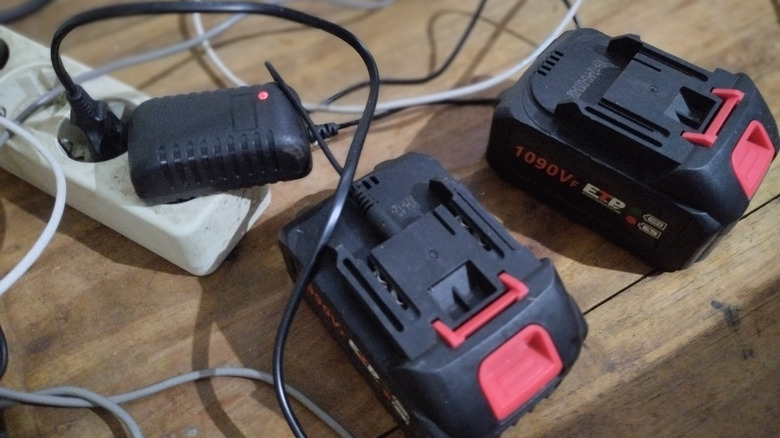What To Know Before Trying To Use Harbor Freight Batteries On Craftsman Tools
Craftsman is a well-known and popular brand of cordless power tools that run on a universal, 20-volt lithium-ion battery. While those batteries have come down in price tremendously over the past three decades, the battery packs can still be expensive. A Craftsman replacement battery can cost over $50. Add in a new charger, and you might spend twice that much.
If you're someone who owns different brands of power tools, wouldn't it be nice to be able to mix and match the batteries that power them? While it's tempting to save money by using Harbor Freight batteries on Craftsman tools, you physically can't without an adapter. Even with an adapter, you risk ruining your tools and may end up spending even more money.
Physically, none of the in-store-brand batteries sold at Harbor Freight fit into Craftsman tools. Try charging an Atlas battery with a Craftsman charger, for example. The pins won't line up. A Craftsman charger has four metal pins; an Atlas has seven. You'll have no more success than if you tried using Schick razor blades with a Gillette razor. Try mixing and matching batteries with tools and chargers, and you're also likely to void your warranty, so if something goes wrong, you're out of luck. The warranty on your Craftsman tools is likely limited only to authorized products sold by authorized sellers.
Why mixing and matching batteries and tools is a really bad idea
There is a reason each manufacturer uses slightly different connectors in their lines of batteries, tools, and chargers, compared to those of other manufacturers. Different power tools can run on different voltages and amperages. Too much of either one and you can burn out the tool's motor. Too little and it will work poorly or not at all. Use a power-hungry tool on a battery that can't supply that much power, and you risk a battery fire.
Charging batteries incorrectly is also one of the common dangers of lithium-ion batteries. Battery chargers have complex circuitry that converts the AC electricity that comes out of your home's outlets into the DC electricity that's stored in your batteries and powers your tools. That circuitry is unique to the battery chemistry and power capabilities of each particular brand of tools. Improperly charging lithium-ion batteries is an all-too-frequent cause of batteries overheating and catching fire, according to the National Fire Protection Association.
You can purchase "interchangeable batteries" that work with multiple devices from the same manufacturer, but they don't work with different brands. There are third-party adapters out there that might allow you to use one manufacturer's batteries on another manufacturer's tools, but this, too, can be a safety or fire hazard, void your warranty, and cost you more in the long run. Since each battery connection is unique, you'd need different adapters for each combination of your different brands of power tools. Stick to the batteries that came with the manufacturer.

